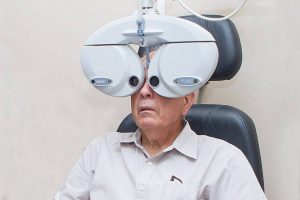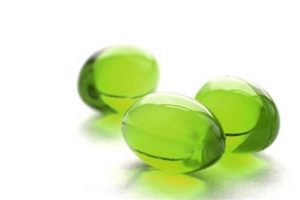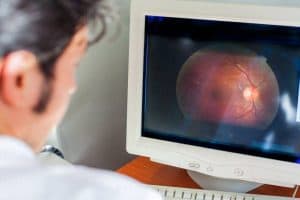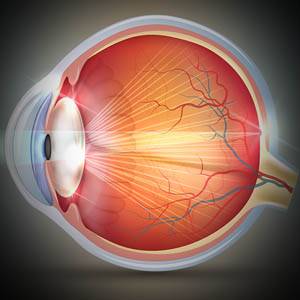Consuming a healthy diet with specific nutritional supplements may reduce your risk of macular degeneration.
Macular degeneration can be a devastating eye condition, resulting in significant vision loss and even blindness if not diagnosed and treated in time.
Although macular degeneration is primarily caused by our genetics and DNA, there is some evidence that maintaining good health and nutrition may play a role in preventing the development or progression of the disease.
Here are our top 6 FAQs about nutrition and macular health:
Q1: What is macular degeneration?
Macular degeneration is a common eye condition affecting the light sensitive layer of tissue at the back of the eye, known as the retina. This tissue layer is responsible for translating visual information into electrical signals to be sent to the brain for interpretation.
Macular degeneration affects the macula, the area in the middle of the retina that is responsible for our clear, sharp and detailed central vision.
If not detected and treated early, this condition can result in significant vision loss, including total blindness.
There are two types of macular degeneration:
Also known as atrophic macular degeneration, this is the most common type. As many as 90% of all cases of macular degeneration fall under this category.
Dry macular degeneration results from a thinning or breaking down of the macula, usually as a result of the build-up of tiny yellow deposits of cellular waste material, called drusen, under the retina.
This build-up of drusen eventually impacts the functioning of the macula leaving a blurry or blind spot in the center of a person’s vision, making everyday activities such as driving and recognizing faces difficult or impossible.
This is a rarer, but much more serious form of the disease, which can become sight-threatening very quickly.
Also known as neovascular macular degeneration, the wet form results from the development of new blood vessels under the macula.
These new blood vessels are thin and fragile, and eventually begin to leak blood and other fluids onto the retina and macula. As these fluids build-up, the macula swells, resulting in loss of vision, and eventually complete blindness if not treated promptly.
Q2: How do supplements help with macular degeneration?
A highly regarded research (AREDS) showed that specific supplements help to prevent dry macular degeneration from transitioning to the wet form, and help prevent vision loss in the second eye after the first has already lost sight due to macular degeneration
Antioxidants such as vitamins A, C and E, help to fight oxidants and free radicals that are the central drivers in the development and progression of macular degeneration.
Zeaxanthin and lutein are nutrients, known as carotenoids, found in certain fruits and vegetables, especially yellow, orange or green leafy ones, that are also found in high concentration in the macula.
Carotenoids serve as a kind of ‘sunscreen’ for the macula, shielding it from the detrimental effects of ultraviolet radiation from the sun.
SEE RELATED: Protecting Yourself From Macular Degeneration
Speak to an eye doctor if you have macular degeneration, you may benefit from taking supplements for your eye health.
Q3: What does research say on supplements for AMD?
The findings of a two-part research project known as the Age-Related Eye Disease Study, or AREDS (October, 2001) and AREDS 2 (November, 2012), showed that certain supplements may be helpful in the reduction of the amount of drusen in the eye.
These studies also showed that supplements are potentially effective in slowing or preventing vision loss in the second eye after the first eye has already been affected by macular degeneration, as well as preventing dry macular degeneration from deteriorating into the more dangerous wet form of the disease.
According to the AREDS studies, the following supplements may be helpful:
- Vitamins A, C and E
- Copper
- Lutein
- Zeaxanthin
Q4: Are there any risks associated with taking supplements?
Yes.
As always, before making major changes to any daily healthcare routine, including starting to take supplements, you should consult with a trusted healthcare professional.
Some vitamins can cause toxicity if not taken properly, and certain health conditions may be negatively affected by some vitamins, minerals and antioxidants found in supplements.
For instance, although beta carotene is recommended as a helpful addition to your diet to protect against macular degeneration, these supplements can significantly increase the risk of lung cancer in people who smoke.
Vitamin A toxicity can result in blurred vision, headaches and dry skin, while vitamin E toxicity can make it harder for your body to absorb other vitamins and minerals, increase bleeding and cause gallbladder and liver problems.
Q5: Are there situations where supplements might not help with macular degeneration?
Yes.
If you have been diagnosed with the early signs of macular degeneration, or have only a few small or medium-sized drusen in one or both eyes, supplements may not be that effective.
The AREDS and AREDS 2 research suggests that supplements may be of benefit once macular degeneration has reached a moderate stage.
Because the benefit of supplements lies in their ability to reduce the amount of drusen in your eyes, those with wet macular degeneration will not benefit.
This is because wet macular degeneration is caused by the buildup of blood and fluid in the eye, not an accumulation of drusen.
Q6: Can smoking increase my risk of developing macular degeneration?
Yes.
Regardless of any genetic predisposition, if you smoke you are statistically up to four times more likely to develop macular degeneration than those who don’t.
Cigarette smoke contains tar, likely contributing to the formation of drusen, the build up of which is the leading cause of dry macular degeneration.
Inhaling cigarette smoke also increases free radicals, throughout the body, including in the eyes, and reduces the effectiveness of antioxidants meant to fight them.
This makes it increasingly difficult for the body to heal and regenerate cells, speeding up aging and making macular degeneration more likely to develop, and at an earlier age.
Cigarette smoke also reduces oxygen and blood flow to the eyes by constricting and damaging them. This may lead to the creation of new, weaker blood vessels in the eye that are easily damaged and begin to leak, causing the development of wet macular degeneration.
LEARN MORE: Guide to Eye Conditions
If you have macular degeneration, schedule an appointment with an eye doctor near you to receive the best treatment and advice on supplements.
There is evidence that maintaining good health and nutrition may play a role in preventing the development or progression of macular degeneration.
Here are our top 6 FAQs on nutrition and macular health.










